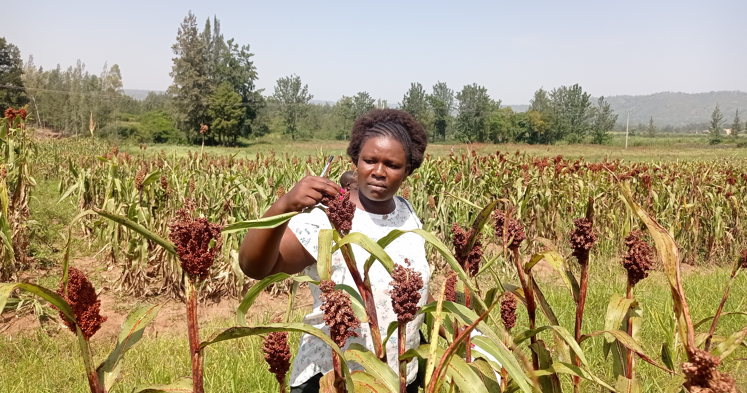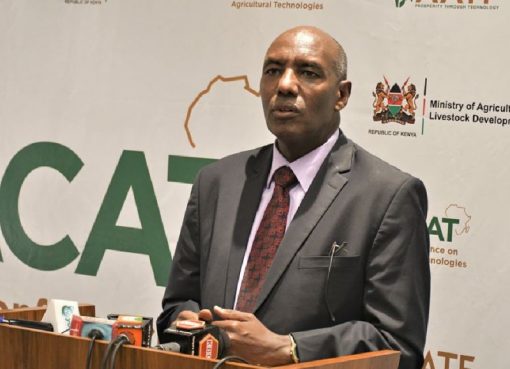Kenya has joined the globe in embracing Genome Editing (GEd) technology to meet the food security needs in the country.
Coupled with climatic changes resulting in low food productivity due to diseases, the new technology which is currently under research will be instrumental in addressing the challenges the country is facing.
According to Kenyan scientists conducting the trials, Genome editing can reduce the time of research by two to five years compared to conventional breeding technologies which take up to 10 years
Genome editing is a modern biotechnology that allows scientists to make precise genetic changes to plants or animals.
`Speaking today during the opening of genome editing science communication training, Director General Dr. Eliud Kireger said that in a region where food security is a constant challenge, the technology could be pivotal in ensuring that millions have access to adequate nutrition.
In a speech read on his behalf by the Deputy Director Dr. Felister Makini the DG however said that training is crucial to sensitize stakeholders to harness the benefits of genome editing and bridge the gap between scientific innovation and public awareness.
Dr. Kireger recognized the collaboration between them and the National Biosafety Authority (NBA), whose commitment to ensuring that genome editing is effectively implemented in Kenya is integral to the success of this program.
Currently the National Biosafety Authority (NBA) has approved four genome edited products for research.
Eric Korir, Principal Biosafety Officer at the NBA said the products include gene edited maize which is resistant to Maize Lethal Necrosis Diseases (MLND) that was approved in 2022 for research by the Kenya Agricultural and Livestock Research Organization (KALRO).
The other product is gene edited nitrogen fixing bacteria (bio fertilizer) used as a seed treatment for cereal crops in 2022 whose bacteria has been edited to enhance its ability to convert nitrogen for the plant and is being done by Agtech Consulting Limited.
The last two Gene edited sorghum varieties are one which is resistant to striga weed, and another variety resistant to herbicides that were approved in 2023 and the technology being carried out by researchers from Kenyatta University.
Korir said “Today, we find ourselves at the intersection of cutting-edge science and the future of sustainable development and therefore Genome editing holds the promise of addressing some of Kenya’s most pressing challenges, be it in enhancing agricultural productivity, improving health outcomes, or conserving our rich biodiversity”.
He added that with the ability to precisely alter genetic material, the technology presents opportunities to improve crop resilience to climate change, develop treatments for genetic disorders, and even mitigate the spread of diseases like malaria.
“As the NBA, our mission is to ensure that advances in biotechnology are applied responsibly and safely and therefore this training is part of that larger mission of building our capacity in-country stakeholders to ensure that we can make informed decisions about the use and regulation of genome editing”, Korir said.
Speaking on the Sorghum varieties, Prof, Steven Runo , a molecular biologist at Kenyatta University and who has been in the frontline of the research on the sorghum varieties said genome editing can provide solutions that can help complement the more traditional ways that we have been using to Manage the parasitic weed striga “ commonly known as Kayongo” and that has for so long been sucking nutrients hence killings plants .
“What we are doing is using new advances in Plant Sciences to try and solve some of the intricate problems we have constraining agriculture in Africa, and genome editing is an advance of traditional breeding technologies”, he added.
“So far, Prof Runo said they have done one cycle field trials, and the next one will follow within the next few years. “We are looking at the data, it’s looking good and also analyzing practically”, Prof. Runo said.
According to Korir, the approvals by NBA were guided by genome editing guidelines published in 2022, while the project is being regulated by the Kenya Plant Health Inspectorate Services (KEPHIS), the national variety testing institution in the country for agronomic and phenotypic performance.
The field trials which are expected to be concluded by 2027 may be the solution to complement conventional seeds and animal breeds.
The two-day training was supported by the African Union Development Agency -AUDA-NEPAD who are leading efforts to optimize agriculture in Africa through genome editing (GED), as part of its mission to promote innovations that accelerate socio-economic transformation.
In Kenya, the Kenya Agricultural and Livestock Research Organization (KALRO) and the Kenya National Biosafety Authority (NBA) are co-hosting and leading the implementation of this initiative.
Genome editing technology has been identified as a potential new option to augment existing interventions in pursuance of achieving the African Union Agenda 2063 with the GEd training program being essential to foster the development and adoption of GEd tools for advancing agriculture and food systems, thereby contributing to industrialization efforts.
By Wangari Ndirangu





